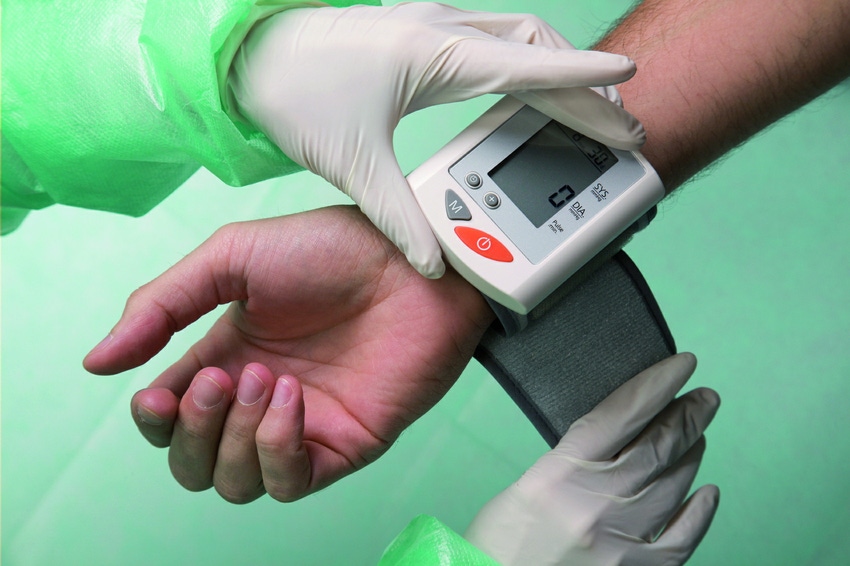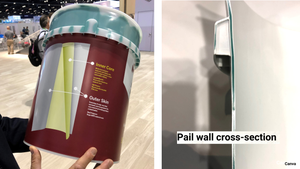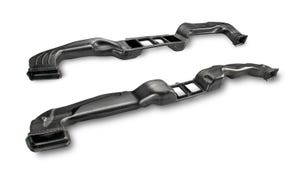PolyOne targets PVC as a polycarbonate replacement
PolyOne, a plastics supplier with $3 billion in sales last year, is boosting its focus on the medical market, and one specific target is replacement of polycarbonate alloys with PVC in housings for medical devices.PVC's superior chemical resistance to polycarbonate is becoming more important as efforts escalate to disinfect medical equipment, said Charles Kutchin, global industry director-healthcare at PolyOne in an interview with PlasticsToday.
March 6, 2013

PolyOne, a plastics supplier with $3 billion in sales last year, is boosting its focus on the medical market, and one specific target is replacement of polycarbonate alloys with PVC in housings for medical devices.
PVC's superior chemical resistance to polycarbonate is becoming more important as efforts escalate to disinfect medical equipment, said Charles Kutchin, global industry director-healthcare at PolyOne in an interview with PlasticsToday.
|
Vinyl targets medical housings. (PolyOne) |
"The major hassle for our customers to solve has been the cost and failure rate associated with the chemical crazing of polycarbonate," Kutchin said. Problems include service calls for damaged devices, warranty claims and product returns. "We think we are bringing a unique solution with vinyl."
It's an important issue because hospital-acquired infections (HAIs) have increased approximately 36% in the last 20 years, and Medicare will no longer reimburse the costs associated with HAIs. According to a new Application Bulletin developed by PolyOne, the cost is estimated at $14,000 per incident.
The Bulletin contains results of PolyOne research showing that Geon HC PVC retains mechanical properties better than polycarbonate alloyed with ABS or polyesters after treatment with three commonly used hospital disinfectants.
Target applications include housings for infusion pumps, blood pressure monitors, defibrillators, ventilators, and barcode scanners.
Medical applications represented 12% of PolyOne's business last year, up from 9% in 2011 as part of a corporate strategy.
And PolyOne sees a bright future for PVC in medical applications.
"The overall industry forecast for growth in PVC this year is about 4%, and we see our own growth rate for PVC as higher than that," said Kutchin.
He has seen no decline in PVC demand as a result of health and safety concerns from hospitals. "What I do see is that procedure rates are down as well as lower healthcare utilization rates. A slight downturn industry wide is due to that and not to safety issues."
PVC is safe
"We have participated for a significant period of time in the market segment," said Kutchin. "The FDA has approved the material. It's used in applications like children's' toys. Our position clearly is that it's a safe material for the (medical tubing and bag) segment."
Kutchin said there is ongoing evaluation of materials by medical device and equipment manufacturers. Most of the focus, however, is on performance. There is also increasing pressure to reduce costs in the healthcare market.
In situations where customers want to make a change due to health and safety concerns about a given type of plastic, Kutchin said that PolyOne is agnostic.
"Our solutions are unbiased. If PVC is the right material for the applications then we do that. But we do also offer silicones and thermoplastic vulcanizates, thermoplastic alloys, and thermoplastic urethane alloys. Medical tubing consumes material across all those platforms."
PolyOne is a legacy producer of PVC via its Geon business, which produced the first usable vinyl plastic in 1927 in a BFGoodrich research project. It sells Dow Corning silicones through its distribution business and TPVs come from ExxonMobil through an exclusive sales arrangement in the medical market. TPEs come from its GLS business and urethanes via its 2009 acquisition of New England Urethane.
PolyOne is also covering its bets in flexible PVC used for medical bags and tubing through development of nonphthalate plasticizers called reFlex. reFlex plasticizers incorporate high levels of renewably resourced materials and have some performance advantages over phthalate plasticizers.
"The market interest has been strong and we have seen some niches where they have been adopted," Kutchin said. PolyOne could not provide specifics due to non-disclosure agreements.
However, Jim Gray, marketing director, PolyOne Specialty Coatings, told PlasticsToday:
"Potential applications for reFlex bioplasticizer in flexible vinyl formulations include collection bags, face masks, prosthetics and other applications that include skin contact and fluids exiting, but not entering, the body. reFlex bioplasticizers have been subjected to a number of tests, and results indicate no identified concerns with toxicity or dermal sensitivity. It is not yet FDA approved, but this is generally not required for devices that do not enter the body or introduce liquids into the body."
You May Also Like



